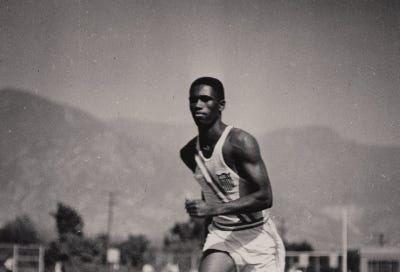Mack Robinson: 1936 Olympic Medalist, Black and Invisible
Robinson won a silver medal second only to the great Jesse Owens, with both men breaking the world record in the 200 meter run
Mack Robinson was the son of sharecroppers and big brother of the first black baseball player to play in major league baseball: Jackie Robinson. In 1920, when Mack was six, his mother Mallie moved her family of five children from Cairo, Georgia to Pasadena, California where Mack and Jackie would be raised.
Mack attended John Muir High School where he was a very successful track athlete. After high school, Mack attended Pasadena Junior College where he posted national junior college records in the 100 meters, 200 meters and the long jump.
Good News/Bad News: I Qualified for the Olympic Trials/I’m Broke
Mack qualified for the 1936 Olympic trials but had no money. A local businessman would pay for his train ticket to the trials in New York. Running in an old pair of shoes, with no coach, Mack would finish second just behind Jesse Owens earning a trip to the 1936 Olympic Games hosted by Nazi Germany in Berlin.
In Berlin, still running in the same old shoes, he would earn a silver medal in the 200 meters only .4 seconds behind Jesse Owens with both men breaking the world record and beating Hitler’s Aryan sprinters in the process.
Hitler and his followers were racists. They believed germans were a superior “master” race. They believed blacks, jews, gypsy’s and slavic peoples were inferior. Mack Robinson and Jesse Owens would prove them wrong. Ironically, Mack and several black athletes on that team would reflect later how well they were treated by german staff in the Olympic Village and german sports fans in general.
Mack’s story is not so much about racism in 1936 Berlin, but rather about the systemic racism black athletes like Mack Robinson faced back home in America at that time.
Mack Robinson, along with the rest of the African American athletes, would perform remarkably well, collecting 83 of America’s 167 points.
Despite his accomplishments, when Mack returned home to Pasadena no one asked him about his achievements. There was no parade or luncheons, no speeches—nothing. It was as if he was invisible.
None of the 18 African-American athletes on Robinson’s Olympic team were invited to the White House; President Franklin Roosevelt hosted only the White athletes.
And lest you think Robinson’s experience was unique, four-time gold medalist Jesse Owens was forced to work as a gas station attendant, janitor and dry clean manager. He would also race people on bikes, cars, trucks and even horses just to earn money and pay the bills.
Owens later was quoted: “People say it was degrading for an Olympic champion to run against a horse, but what was I supposed to do? I had four gold medals, but you can't eat four gold medals".
Robinson and Owens came home Olympic Medal winners but, as black men in America, they still had to sit in the back of public buses.
During the Olympics, Mack had befriended University of Oregon head coach Bill Hayward who persuaded him to enroll there in the 1937-1938 academic year. At Oregon, Robinson won numerous titles and set a school record in the 220-yard hurdles.

Mack Robinson would graduate from the University of Oregon in 1941 with a degree in physical education. He later applied for work with the city of Pasadena where the only job he was offered was as a street sweeper on the night shift.
In 1942 a judge would order the city of Pasadena to desegregate its public pool opened in 1914 and since then was only open to blacks one day a week. In retaliation the city would fire all its black employees including Robinson, and close the pool altogether until 1947.
Redemption
Later Mack would work in city government in other municipal jobs including park director and truant officer. And slowly the times would change for forgotten black athletes like Mack.
In 1984 in Los Angeles Mack Robinson was chosen to be the flag bearer for the US team at the Olympic Games opening ceremonies in the Coliseum. He would later say that was his greatest honor.
And finally in 1997, in what was surely a moment of redemption for Mack and his family, the City of Pasadena would dedicate two statues to Jackie and Mack Robinson directly across the street from city hall.
And in 2000, the year Mack died, Pasadena City College named its new sports stadium after him and a post office would be named in Mack’s honor as well.










